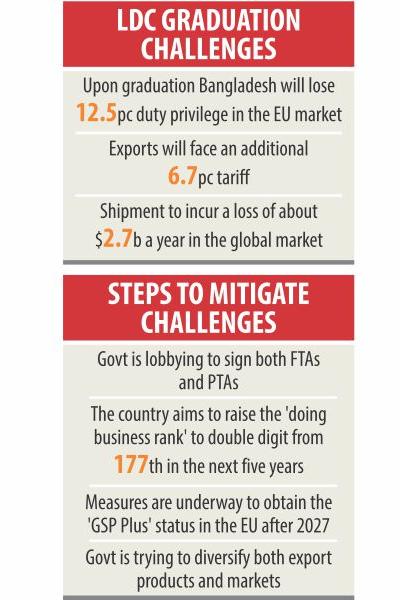FTAs will steer the way in post-LDC era

The government is working to sign both free trade agreements and preferential trade agreements with major trading partners to offset the probable bad impact on exports upon graduation from the least-developed country bracket in 2027.
“We have a lot of time in our hands to complete a lot of things to retain our trade privileges,” said an official of the commerce ministry requesting anonymity.
Upon graduation, Bangladesh's exports will face an additional 6.7 percent tariff, which could result in an estimated export loss of about $2.7 billion in a year, Mia Seppo, United Nations resident coordinator in Bangladesh, said in a recent meeting in Dhaka.
The amount of loss is equivalent to 8 percent of Bangladesh's export receipts in 2015, she said.
The United Nations Conference on Trade and Development has estimated that exports may fall 5.5 percent to 7.5 percent after graduation.
In 2016, the value of exports from Bangladesh to preference granting countries was $24.7 billion, which is 72 percent of total receipts.
Regional trade agreements and bilateral initiatives cover about 90 percent of Bangladesh exports.
“We are assessing our challenges and opportunities after graduation under the high-powered taskforce headed by the prime minister's office,” said Kazi Shofiqul Azam, secretary of the Economic Relations Division.
The taskforce will recommend action plans for offsetting any probable bad impact on overseas trade. “We have until 2024,” Azam said.
A recent survey by HSBC said a probable vulnerability for Bangladesh is that the country is not a member of any mega trade deals like the Trans-Pacific Partnership and China's Belt and Road Initiative.
However, Vietnam's presence in the TPP poses a threat to Bangladesh's future growth in the production of garments, it said.
Last month, a team from the commerce ministry held talks in Beijing as a follow-up to the preliminary agreement signed during Chinese President Xi Jinping's visit to Bangladesh in October in 2016 over an FTA with China.
An FTA with Sri Lanka is in the final stages, the commerce ministry official said.
The government's primary target though is to continue to be eligible for the GSP plus scheme of the European Union as it is the largest export destination of Bangladesh.
Last fiscal year, the EU accounted for 55 percent of Bangladesh's total shipments.
For retaining the EU's 12.5 percent duty privilege, Bangladesh has been working to improve the overall business and governance conditions as per the recommendations by the EU and some other international organisations.
Bangladesh will have to ratify 27 UN conventions, including four core ones, in areas of human rights, labour rights, environment and good governance for gaining the GSP plus status to the EU.
“We are working under a taskforce for improving those areas.”
The government is also working to improve the country's ease of doing business ranking so that both the business and investment climate improve substantially.
At present, Bangladesh comes in at 177 spot in the World Bank's Ease of Doing Business index, and the government has targeted a leap to double digits within the next five years.
Another important step is to diversify both the markets and products within next few years so that overdependence on some traditional markets including the EU, US and Canada is brought down.
“Product diversification has not been taking place despite a lot of efforts,” the commerce ministry official added.
Apparel items contributed to about 83 percent of the export receipts last fiscal year.
